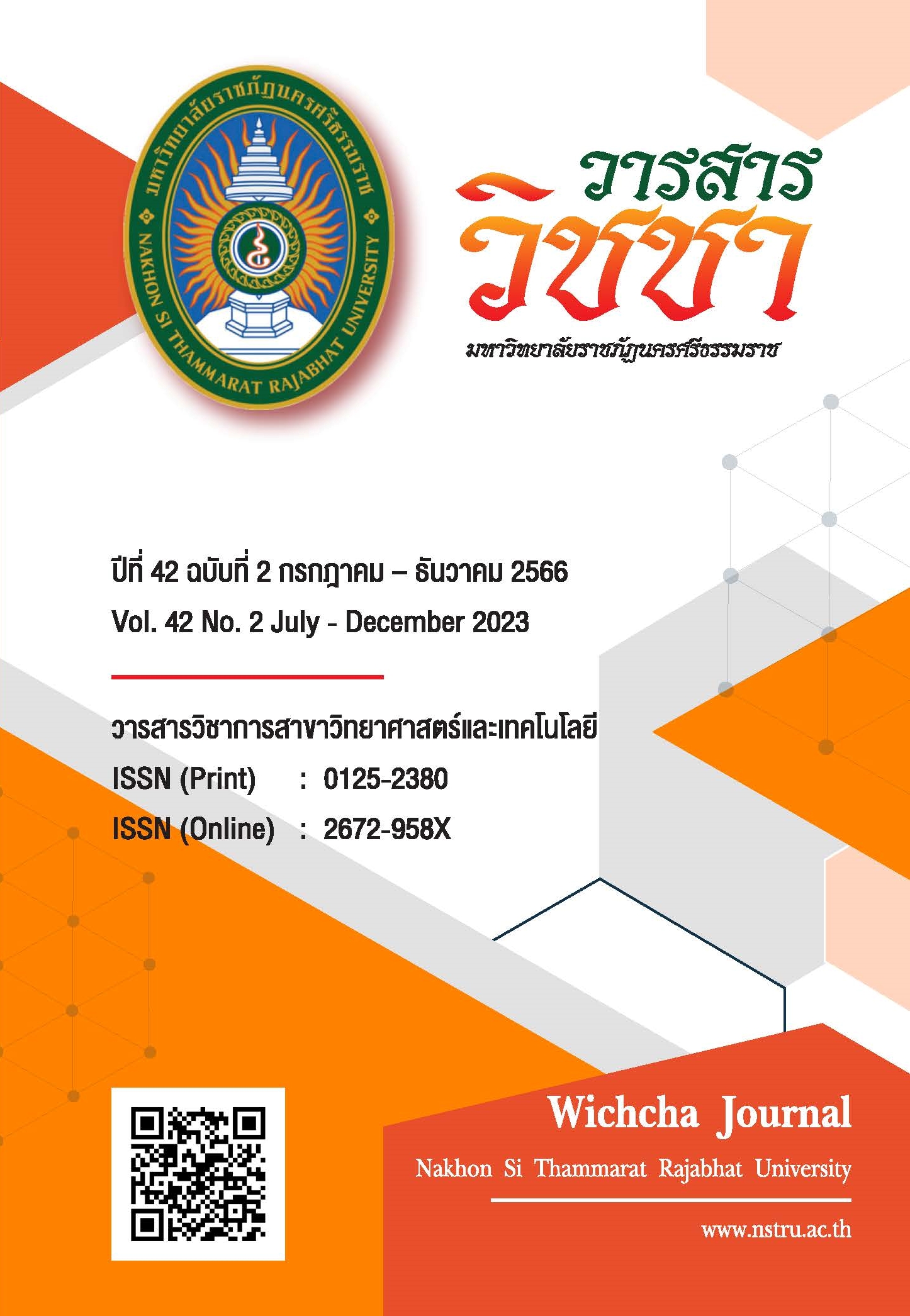The Effects of Zinc Supplementation on Zing Accumulation in Sunflower Sprouts
Main Article Content
Abstract
The study of zinc supplementation aimed to investigate effects of sunflower seedlings growth and yield. The experiment was in a completely randomized design (CRD) with 3 replications and 5 treatments, The treatments consisted of non-zinc applied (Treatment 1; Control), 2.5 gram (g) (Treatment 2), 5.0 g (Treatment 3), 7.5 g (Treatment 4) and 10.0 g (Treatment 5) in 20-liter water. The data were collected on seed germination rate and yield of 14 days old sunflower seedlings and zinc accumulation. The results showed that the higher rates of zinc supplementation could increase the yield of sunflower seedlings. Non-zinc sunflower seedlings (control) had the highest germination rate and yield fresh weight. From the Zn analysis in sunflower seedlings, the zinc concentration of 2.5 g had the highest zinc accumulation of 465 milligrams per kilogram (mg/kg), followed by zinc concentrations at 5.0 g, 7.5 g and 10.0 g were 393, 387 and 272 mg/kg, respectively. The results showed a positive correlation between yield and zinc accumulation in sunflower seedlings. Then, the zinc concentration of 2.5 g was good at the optimum rate for the growth, improving yield and zinc accumulation in sunflower seedlings, which is an alternative way to increase the amount of zinc in plants for the health benefits of consumers.
Article Details

This work is licensed under a Creative Commons Attribution-NonCommercial-NoDerivatives 4.0 International License.
เนื้อหาและข้อมูลในบทความที่ลงตีพิมพ์ในวารสารวิชชา มหาวิทยาลัยราชภัฏนครศรีธรรมราช ถือเป็นข้อคิดเห็นและความรับผิดชอบของผู้เขียนบทความโดยตรง ซึ่งกองบรรณาธิการวารสารไม่จำเป็นต้องเห็นด้วยหรือร่วมรับผิดชอบใด ๆ
บทความ ข้อมูล เนื้อหา รูปภาพ ฯลฯ ที่ได้รับการตีพิมพ์ในวารสารวิชชา มหาวิทยาลัยราชภัฏนครศรีธรรมราช ถือเป็นลิขสิทธ์ของวารสารวิชชา มหาวิทยาลัยราชภัฏนครศรีธรรมราช หากบุคคลหรือหน่วยงานใดต้องการนำข้อมูลทั้งหมดหรือส่วนหนึ่งส่วนใดไปเผยแพร่ต่อหรือเพื่อการกระทำการใด ๆ จะต้องได้รับอนุญาตเป็นลายลักษณ์อักษรจากวารสารวิชชา มหาวิทยาลัยราชภัฏนครศรีธรรมราชก่อนเท่านั้น
The content and information in the article published in Wichcha journal Nakhon Si Thammarat Rajabhat University, It is the opinion and responsibility of the author of the article. The editorial journals do not need to agree. Or share any responsibility.
References
ชาญชัย รุผักชี พรไพรินทร์ รุ่งเจริญทอง ธวัชชัย อินทร์บุญช่วย และศุภชัย อำคา. (2564). การให้ปุ๋ยสังกะสีทางใบต่อการเจริญเติบโตและผลผลิตของข้าวที่ปลูกในชุดดินนครปฐม. แก่นเกษตร, 49(1), 901-905.
พัชรินทร์ ตุ้ยวงค์ และชนากานต์ เทโบลต์ พรมอุทัย. (2564). การเพิ่มผลผลิตและการสะสมธาตุสังกะสีในเมล็ดข้าวโดยการจัดการปุ๋ยสังกะสีในพันธุ์ข้าวนาสวนและข้าวไร. แก่นเกษตร, 49(4), 799-809.
ภณกฤด อุ่นพิพัฒน์ ณัฐพล จิตมาตย์ และเสาวนุช ถาวรพฤกษ์. (2561). การเพิ่มความเป็นประโยชน์ของธาตุสังกะสีด้วยซิงค์ฮิวเมทที่เตรียมจากพีตสำหรับข้าวโพดหวานที่ปลูกในดินเนื้อปูน. แก่นเกษตร, 46(1), 301-307.
อนันต์ พิริยะภัทรกิจ พัชรี เดชเลย์ พรกมล รูปเลิศ และปุญญพัฒน์ พลพิมพ์. (2566). ผลของปุ๋ยสังกะสีที่ให้ทางใบต่อผลผลิตและความเข้มข้นของสังกะสีของข่า. วารสารวิชชา มหาวิทยาลัยราชภัฏนครศรีธรรมราช, 42(1), 14-23.
เอมอร อุดมเกษมาลี พรนพ นัยเนตร และอรพร ดำรงวงศ์ศิริ. (2563). สังกะสี. ใน สุปราณี แจ้งบำรุง. ปริมาณสารอาหารอ้างอิงที่ควรได้รับประจำวันสำหรับคนไทย dietary reference intake for thais, หน้า 319-330. กรุงเทพฯ: เอ.วี. โปรเกรสซีฟ.
Boardman, R. and McGuire, D.O. (1990). The role of zinc in forestry. I. Zinc in forest environments, ecosystems and tree nutrition. Forest Ecology and Management, 37(1-3), 167-205, doi: https://doi.org/10.1016/0378-1127(90)90054-F.
Khabour, O.F. and Hassanein, S.F.M. (2021). Use of vitamin/zinc supplements, medicinal plants, and immune boosting drinks during COVID-19 pandemic: A pilot study from Benha city, Egypt. Heliyon, 7(3), 11-17, doi: https://doi.org/10.1016/j.heliyon.2021.e06538.
Stanton, C., Sanders, D., Krämer, U., and Podar, D. (2022). Zinc in plants: Integrating homeostasis and biofortification. Molecular Plant, 15(1), 65-85, doi: https://doi.org/10.1016/j.molp.2021.12.008.
Tsuruoka, T., Kodama, A., Yamaguchi, S., Masutomi, T., Koyama, A., Murohara, T., Komori, K. and Shibata, R. (2022). Zinc deficiency impairs ischemia-induced angiogenesis. JVS-Vascular Science, 3, 30-40, doi: https://doi.org/10.1016/j.jvssci.2021.09.023.


